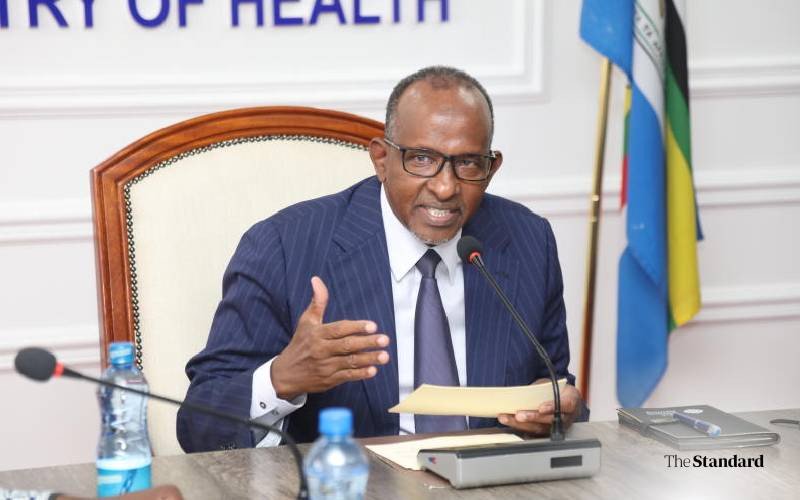
The Global Fund (GF) has significantly reduced its health financial support to Kenya, just months after the US government froze foreign aid.
Kenya's allocation, according to a letter dated June 30, 2025, dropped from $407,989,067 (Sh53 billion) to $354,331,970 (Sh46 billion), leaving a funding gap likely to jeopardise efforts in the fight against HIV, tuberculosis (TB), and malaria.
In its address to the Health Cabinet Secretary (CS) Aden Duale, the organisation urged the government to develop sustainable strategies to safeguard the progress made in the health sector.
While some donor payments have been received recently, the Global Fund said a funding gap remains between available resources and current grant commitments, prompting a re-prioritisation of support to partner countries.
"This is a difficult and unavoidable decision," the donor said in the letter.
"Countries must now reconsider how best to use the remaining GC7 grant amounts together with domestic resources and other funding sources to continue saving lives."
As part of the revised support, Kenya has been allocated $2 million to support the early adoption of lenacapavir (LEN PrEP)-a promising injectable HIV prevention drug administered twice a year.
- SHA: Patients' one-year pain, scandals and unpaid claims
- Duale unveils Sh5.4b bailout and anti-fraud drive for Taifa Care rollout
- Government to pay Sh5.3 billion NHIF arrears to hospitals
- Kenya steps up health investments to safeguard mothers and children
Keep Reading
The inclusion positions Kenya as a potential early implementer of the innovative HIV prophylactic, depending on the country's readiness to roll out the intervention at scale.
The fund emphasised that final grant amounts will be subject to Kenya Coordinating Mechanism (KCM) decisions, which must be made by July 14, 2025.
The KCM has the latitude to either accept the new indicative grant allocations or propose alternatives based on national health priorities and system gaps.
However, any revised totals must not exceed the new reduced allocation.
The KCM, a national oversight body, has been directed to convene stakeholders-including civil society, community representatives, and implementing partners-for consultations to ensure inclusive and transparent decision-making.
The Global Fund further clarified that any activities previously paused during an April 2025 adaptation process will remain on hold unless re-approved.
Reprioritization and reinvestment plans will be coordinated jointly by the Global Fund Secretariat, the KCM, and Principal Recipients of the grants.
The Fund noted that its board has discussed and endorsed a re-prioritization approach to guide the funding process, to ensure that the organization is able to best support countries and communities to preserve and enable access to lifesaving interventions.
"Effective from the date of this letter, the reduced allocation amount for Kenya is US$354,331,970," adds the letter.
While Kenya must now navigate tough funding choices, the Global Fund reaffirmed its commitment to support essential services and maintain access to lifesaving interventions.
"The next few months may require some difficult discussions and trade-off decisions," the statement read. "But inclusivity and the voices of communities must remain at the heart of the process."
The Global Fund has been a critical partner in Kenya's health sector, contributing significantly to the fight against the three major diseases and health systems strengthening.
The recent reduction in funding is likely to reignite debates on Kenya's domestic health financing and the need for sustainable, long-term solutions.
The country pledged US$10 million for the Global Fund's Seventh Replenishment, covering 2023-2025.
This represents a 67 percent increase over its sixth replenishment pledge and a firm sign of its commitment to alleviating the burden of the three diseases and building strong and resilient health systems.
Kenya is a donor to the Global Fund and an implementer of Global Fund-supported programs.
At least 40 per cent of HIV treatment is supported by Global Fund, which further supports 30 per cent of TB activities and malaria.
Support from Global Fund and U.S. government has strengthened Kenya's response to HIV and maternal healthcare, including prevention of mother-to-child transmission.
Since 2010, Kenya has gradually reduced new HIV infections by more than 67 per cent, decreasing from 101,000 cases in 2010 to approximately 16,752 infections in 2024.
At least 1,378,457 Kenyans are living with HIV, of whom 1,336,681 are on treatment, with 7 percent mother-to-child transmission, shy of 2 percent to reach the global target of below 5 percent.
The stop-work order issued by the US Government left a Sh30.9 billion funding gap, which the Kenyan government has yet to bridge.
Although donor funding-including from the US government-was expected to decline gradually, the abrupt stop-work order caught many by surprise.
Dr Daniel Mwai, a health economist and presidential health advisor, told The Standard in a previous interview that the support was expected to taper off slowly as Kenya increased domestic financing to fully take over.
"Donor funding has been declining for years, even before the US issued the stop-work order," he said. "The transition plan was never meant to be abrupt; it was supposed to be gradual. What we are seeing now is a radical shift."
To fill the gap, he said, the government is integrating health services, moving away from the donor-driven model of verticalized care.
"What we need is for the government to prioritize funding for key strategic health areas," said Dr Mwai.
 The Standard Group Plc is a multi-media organization with investments in media
platforms spanning newspaper print
operations, television, radio broadcasting, digital and online services. The
Standard Group is recognized as a
leading multi-media house in Kenya with a key influence in matters of national
and international interest.
The Standard Group Plc is a multi-media organization with investments in media
platforms spanning newspaper print
operations, television, radio broadcasting, digital and online services. The
Standard Group is recognized as a
leading multi-media house in Kenya with a key influence in matters of national
and international interest.











